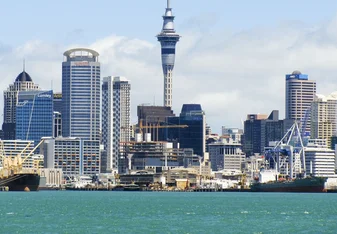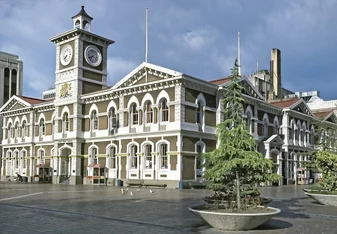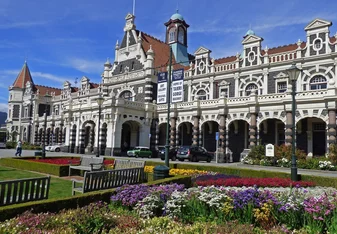Study Abroad in Wellington, New Zealand
About
As the capital of New Zealand, Wellington (southern part of the North Island), or “Welly” for short, was voted by Lonely Planet as the “coolest little capital in the world,” not too bad a title. Firstly, Wellington (as most of New Zealand) is beautiful to look at (Lord of the Rings anybody?). Bushy hillsides, rocky coastlines and a stunning harbor create the scenic view New Zealand is famous for. However, the vibrant, compact city is what differentiates it from the rest of New Zealand.
Restaurants, bars, trendy cafes and art galleries line the middle of the city and are all within easy walking distance due to city’s small size. If you like theater, music, dance, art, galleries, museums and most importantly, culture, Wellington is the place for you.
Popular Destinations
Whether it’s exploring the surrounding nature New Zealand is so famous for, biking along the trails towards wineries and vineyards, or strolling through the city looking from boutique to museum, Wellington will give you a different experience every day.
Museum of New Zealand Te Papa Tongarewa
The obligatory museum visit is the first thing I’ll list for Wellington. Translating roughly to “the place of treasures of this land”, this is the national art gallery and museum of all of New Zealand. In all of the museums I’ve mentioned in my guides, I would say this one is the one you must visit. The best part? It’s free! Of course, as the national museum, there are always a few special presentations that require pay, but otherwise you get the museum for no charge.
Lookout Points
Because Wellington is surrounded by hills, the areas around the city offer great views. In order of decreasing quality (though they are all worth a look), the lookout spots are Mount Victoria, Mount Kakau, Wrights Hill, Brooklyn Wind Turbine and Massey Memorial. If you’ve considered studying abroad in New Zealand, these views are probably why, and you won’t be disappointed.
Zealandia
Also known as the Karori Wildlife Sanctuary, it houses New Zealand’s beautiful wildlife and protects them from the nonnative predators caused by globalization. This is probably the most convenient way to see New Zealand’s indigenous flora and fauna, unless you feel like walking through all of New Zealand (which would be one heck of an adventure). Open daily from 10am to 5pm, the sanctuary costs $17.50 for entry.
Botanic Garden
This area is great for a picnic or just some afternoon walking. (As you may have noticed, studying in New Zealand will be a lot of beautiful scenery and the walks a long the way). You can reach the top either through cable car or walking. Once you’re at the top, there are the Cable Car Museum, a nice lookout point (a lot of these around Wellington), and the Carter Observatory. This is definitely one to take a whole day for.
Scholarships
If money is causing you problems in the US (as I'm assure it is as students...unfortunately), then it'll probably do the same abroad (if not more). Fear not! Here are a few scholarships.
- The New Zealand International Undergraduate Fees Scholarship is available to international undergraduate students and are merit-based.
- Break Out is a searchable database of over 2,200 awards, scholarships and grants for individuals in New Zealand. Break Out is New Zealand's most comprehensive source of scholarship information.
- More Study Abroad Grants and Scholarships
Planning Your Trip
Affordability
Wellington is on the New Zealand dollar, which roughly translates to one US dollar. In addition, as the capital of New Zealand, you can expect prices to be a bit more expensive than the rest of New Zealand. Even so, if you’ve been living ok in the US, Wellington should pose no issue to your wallet. ATMs can be found all over Wellington, so cash withdrawal will not be a problem. Normally, withdrawing cash from inside the bank is a lot safer than the ATMs outside, but Wellington is a generally safe place, so you can do so without much risk.
Culture Shock and Support
New Zealand is a good distance away from the US. As a result, the experiences to be had here will be different, surprising and also rewarding. They do indeed speak English in New Zealand, but the distance and change can be daunting to some students. As such, be sure to pick a problem that caters to American students, so that you can be well informed of the cultural differences and avoid making a faux pas.
However, remember that you have your fellow students! If you’re missing the long hours of studying and the obnoxiously loud people back in the US, well, then you’re weird. On a more serious note, talk to your fellow peers! If you’re experiencing some homesickness, there is every chance that they are as well. Don’t be embarrassed if you need to talk to someone about home, it is completely normal and who knows, you may become even closer friends!
Insider Tips
Wellington is well suited to walking due to its compact size. Unlike a Ho Chi Minh, the pedestrian atmosphere is friendly and safe. However, the bus system is extensive and will get you where you want. Taxis also run abound around Wellington, but be sure to check the fare rates before getting in.
Be sure to sample all the food Wellington has to offer! Cafes, Chinese cuisines, fine dining, fish and chips, Indian, Japanese, Mexican, Turkish, you name it and Wellington has it. It even has food tours as a testament to the diverse and delicious food Wellington has to offer.
In Conclusion...
All in all, Wellington offers a bit of everything you want: great food, a vivacious city and beautiful nature to top it all off. Now get on over to Wellington already!
Contributed by Albert Ji
Study Abroad Programs in Wellington
Frequently Asked Questions
-
Do I need a visa to study abroad in New Zealand?
You'll only need a student visa for New Zealand if you'll be studying full time and if the course is longer than 3 months.
-
Is New Zealand a good place to study abroad?
New Zealand is a fantastic choice for a semester abroad. It's known for beautiful landscapes, friendly locals, and world-class universities. There are lots of opportunities to go on adventures either within New Zealand or in nearby Australia.
Related Content -
How much does it cost to study abroad in New Zealand?
Tuition costs will vary by institution and by direct enrollment versus third-party provider. Directly enrolling in a university will be the cheaper option, running you $8,000-$13,000 for the semester. Going through a provider might cost $13,000-$18,000 for the semester. But keep in the mind the other costs associated with studying abroad: meals, rent, cell phone, transportation, etc. Expect to spend $3,000-$4,500 for a semester after airfare and program fees.
Related Content

















